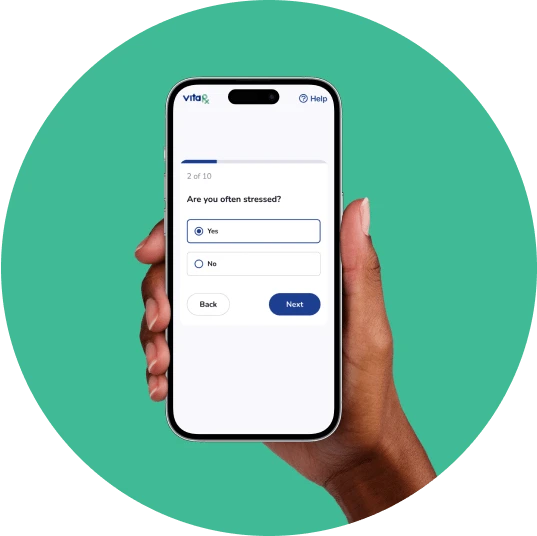Last update: June 27, 2025
10 minute read
Biometric Screening: Understanding Its Purpose and What Tests It Involves
Discover how biometric screening can unlock the secrets of your health, identify hidden risks, and supercharge your wellness journey.

By Derick Rodriguez, Associate Editor
Edited by Yerain Abreu, M.S.

Ever wondered if there's a quick and reliable way to truly understand your internal health? Believe it or not, in less than twenty minutes, a biometric screening can deliver insights about your cholesterol, blood sugar, body fat distribution, and more—numbers that could literally save your life.
Once you know where you stand, making targeted lifestyle improvements—like harnessing science-backed supplements like plant sterols and omega-3 fatty acids—becomes not just possible, but powerful.
Key takeaways
- Biometric screening is your personal health roadmap, revealing crucial data about your body's inner workings
- It measures key indicators like blood pressure, cholesterol, and glucose levels - the holy trinity of health metrics
- Regular screenings can catch potential health issues before they become full-blown problems, saving you time, money, and heartache
Alright, let's cut through the noise and get straight to the meat of what biometric screening is all about. In just 15-20 minutes, you can get a comprehensive snapshot of your health that would make even the most advanced smartwatch blush. We're talking real, useful data that can quite literally change the game for your health.
VitaRx Tip
Biometric screenings are so impactful that financial incentives for participating can increase employee participation by 55%.
Body composition
What is body composition?
Body composition includes your height, weight, BMI (body mass index), and waist circumference.
What does the screening check?
- Height and Weight: Used to calculate your BMI.
- BMI: Assesses overall body fat.
- Waist Circumference: Measures abdominal fat.
What's the difference between BMI and waist circumference?
BMI checks general body fat using height and weight, but doesn’t show where fat is stored. Waist circumference shows central (abdominal) fat, which is riskier for heart and metabolic health.
Why it matters
Carrying extra weight around your middle is a major red flag for heart disease and diabetes. It's not just about looking good in your jeans; it's about safeguarding your life.
See the healthy range below:
Measurement | Ideal Values |
|---|---|
BMI | 18.5 - 24.9 |
Waist Circumference | Men: ≤ 40", Women: ≤ 35" |
Knowing your waist circumference can reveal potential obesity-related health risks, especially if it goes over 40 inches in men or 35 inches in women.

Blood pressure
What is blood pressure?
Blood pressure measures the force of blood moving through your arteries. It's often called the "silent killer" because high blood pressure typically has no symptoms.
What does the screening check?
- Systolic Pressure: Top number, pressure during heartbeats.
- Diastolic Pressure: Bottom number, pressure between beats.
Why it matters
High blood pressure greatly increases your risk of heart disease and stroke.
See the healthy ranges below:
Blood Pressure Category | Systolic/Diastolic (mm Hg) |
|---|---|
Normal | < 120 / < 80 |
Elevated | 120-129 / < 80 |
High (Stage 1) | 130-139 / 80-89 |
High (Stage 2) | ≥ 140 / ≥ 90 |
If your numbers are just over 120/80, you may be in the elevated or early high blood pressure stage—not a crisis, but reason to act. According to CDC data, high blood pressure is a major risk for heart disease and stroke, and biometric screenings are a quick way to uncover it.
Cholesterol levels
What is cholesterol?
Cholesterol is a type of fat found in your blood. There are different types, and each tells a story about your heart health.
What does the screening check?
- Total Cholesterol HDL ("Good" Cholesterol)
- LDL ("Bad" Cholesterol)
- Triglycerides (Another type of fat in your blood)
Why it matters
Your arterial health depends on these numbers—balance is crucial.
Here’s why each type matters:
- HDL (“Good”): Removes cholesterol from arteries.
- LDL (“Bad”): Builds up in arteries.
- Triglycerides: High levels = greater heart risk.

Get your personalized vitamin recommendations in less than 3 minutes.
Get your personalized vitamin recommendations in less than 3 minutes.

Blood glucose
What is blood glucose?
Blood glucose is your body's primary source of energy. Your body carefully maintains its levels for health.
What does the screening check?
Fasting Blood Glucose: Measures sugar in your blood after not eating for at least 8 hours.
Why it matters
A high reading could warn of prediabetes or diabetes before symptoms appear. If your fasting blood glucose is above 100 mg/dL but below 126 mg/dL, you could be prediabetic—a warning flag, not a diagnosis.
VitaRx Tip
Early identification of prediabetes or diabetes risk through biometric screenings can prevent costly and severe health problems later.
Additional assessments
What else can be checked?
Some biometric screenings test for cotinine levels, which detect tobacco use. Cotinine is a substance formed after nicotine enters your body—it’s considered the gold standard to confirm recent tobacco use, even with minor exposure.
But here's the main point: biometric screening isn't just about getting a bunch of numbers. It's about understanding those numbers and using them to create a solid health plan. Knowledge about your own body isn’t just power—it’s superpower territory.
Why biometric screening matters
Early detection is key
Biometric screening can catch possible health issues before they become full-blown problems. It's like having a health crystal ball. These screenings serve as a "necessary check-up,” helping find conditions early when they are easiest to manage.
Are these screenings a replacement for your annual physical? No, they’re a quick health snapshot but can’t take the place of a full doctor’s exam that checks for a wider range of conditions.
Personalized health plans
Once you know your numbers, you can work with health professionals to create a health plan that addresses your specific needs. No more generic, one-size-fits-all advice.
Curious how these plans work? Most wellness programs use your biometric results to suggest particular lifestyle changes, medical checkups, or workplace plans.
Motivation for change
There's something powerful about seeing your health numbers in black and white. It can be the push you need to make positive changes.
When you see actual numbers, it’s easier to set small, realistic goals—like lowering your LDL by 10 points or walking an extra 1,000 steps daily.
Cost savings
For employers, offering biometric screenings can lead to big healthcare cost savings down the road. Healthy employees are productive employees.
See how screenings change outcomes:
Without Screenings | With Screenings |
|---|---|
Higher chronic disease rates | Early detection, fewer problems |
Increased healthcare claims & costs | Preventive care lowers costs |
Reactive, not proactive, interventions | Personal, proactive wellness |
More than 50% of large firms offered biometric screenings as of 2014 due to clear cost benefits and improved health.
Better wellness culture
When companies offer biometric screenings, it sends a powerful message: "We care about your health." A strong, health-aware workforce means fewer sick days, better teamwork, and higher employee retention.
What if my numbers aren’t great?
But let's address the elephant in the room — what if your numbers aren't great?First off, breathe. This isn't a death sentence; it's an opportunity.
Knowledge is power, and now you have the power to make changes. What’s considered a “small change”?
- Swapping sugary drinks for water
- Adding a daily 20-minute walk
- Adjusting portion sizes
All of these can start to shift your numbers in the right direction.
VitaRx Tip
Even small changes revealed by biometric screenings—like a better diet or more activity—can delay or prevent chronic diseases, leading to major long-term benefits.
Targeted nutritional supplements
Here's where things get really interesting. Enter the world of targeted nutritional supplements.
- For cholesterol management: Plant sterols and stanols can help lower LDL cholesterol.
- Blood pressure support: Omega-3 fatty acids, mainly from fish oil, can help keep blood pressure levels healthy.
- Blood sugar control: Chromium and alpha-lipoic acid have shown promise in supporting healthy glucose use by your body.
Always consult your doctor before starting any new supplement, especially if you take medications or have health problems.
Supplements are just that—add-ons. They're not a replacement for a healthy diet and lifestyle, but they can help you along your health journey.
The right supplement strategy, combined with understanding from your biometric screening, is like adding a boost to your health engine.
Getting the most from your biometric screening
Here are the steps for success:
- Be consistent: Regular screenings help you track your progress over time.Most experts recommend yearly screenings, or more often if you’ve had health concerns.
- Act on the results: Use your screening as a starting point for positive change.Set realistic goals based on your numbers.
- Work with professionals: Don’t go it alone. Team up with healthcare providers who can help explain your results and guide your health journey.
- Use technology: Many wellness programs now offer apps or online tools to help you track your numbers and progress. These apps often connect directly with your screening results, set reminders for follow-ups, and let you log health habits over time.
- Encourage others: If your workplace offers biometric screenings, spread the word. The more people who participate, the more helpful and effective these programs become.
Let's be real — taking control of your health can be scary. But biometric screening takes the guesswork out. It's like having a roadmap for your body, showing you exactly where you are and where you need to go.
Still wondering if it’s truly worth your time? Most people say screenings bring “peace of mind”—if you’re healthy, great! If not, you’ve got a head start on fixing things.
Your next steps
So, here's my challenge to you: If you haven't had a biometric screening, make it a priority.
If your workplace offers it, take advantage of it. If not, talk to your healthcare provider about getting one. Your future self will thank you.
Remember, this isn't about judgment or fear. It's about taking charge, taking control of your health, and writing your own story of living well and staying healthy.
Your biometric screening results aren't just numbers on a page. They're the first chapter of your health change story. How will you write the rest?
Frequently asked questions (FAQ)
Here are some of the most frequently asked questions about biometric screenings.
Final thoughts
A biometric screening isn't an intimidating verdict on your lifestyle; it's your expert-crafted roadmap to better health and long-term vitality.
With just a few crucial numbers, you're equipped to make smarter choices, spot health issues early, and even boost workplace wellness culture. Can you really afford not to know your health numbers?
Sources and references
Editor

Derick Rodriguez
Derick Rodriguez focuses on editing health and wellness-related content. With over half a decade of experience in the digital realm, Derick has developed a unique skill set that bridges the gap between complex health concepts and accessible, user-friendly communication. His approach is deeply rooted in leveraging personal experiences and insights to illuminate the nuances of health and wellness topics, making them more approachable and empowering readers with knowledge and confidence.
Editor

Yerain Abreu
Yerain Abreu is a content strategist with over seven years of experience. He earned a Master's degree in digital marketing from Zicklin School of Business. He focuses on medical and health-related content, working with top healthcare professionals to ensure content is engaging and reliable.
At VitaRx, we're not just passionate about our work — we take immense pride in it. Our dedicated team of writers diligently follows strict editorial standards, ensuring that every piece of content we publish is accurate, current, and highly valuable. We don't just strive for quality; we aim for excellence.
Related posts
While you're at it, here are some other relevant articles you might be interested in.

Get your personalized vitamin recommendations in less than
5 minutes.
Get your personalized vitamin recommendations in less than
5 minutes.




